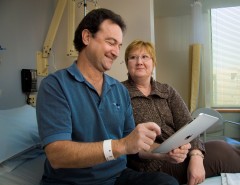 At age 7, Sophie was treated for a brain tumor at Dana-Farber/Children’s Hospital Cancer Center. As a result of her treatment, she struggled with ongoing fatigue, weakness on her right side, and chronic headaches.
At age 7, Sophie was treated for a brain tumor at Dana-Farber/Children’s Hospital Cancer Center. As a result of her treatment, she struggled with ongoing fatigue, weakness on her right side, and chronic headaches.
Sophie began her freshman year as one of 2,000 students at a large public high school. Despite support from special education teachers, she struggled with the academic demands of her classes and the overwhelming size of the school. An extremely dedicated student, she spent hours each evening on homework, but she tired easily, which made the headaches worse, and she struggled to get through each school day.
More children than ever are surviving cancer. But some will pay a price in long-term effects. Radiation and chemotherapy for cancers involving the central nervous system (including brain tumors and leukemia) can impair problem-solving, multi-tasking, attention, and memory, putting students at risk for learning difficulties.

 At many supermarkets, you can dump a pocketful of change into a machine that rapidly counts your coins, sorting them into pennies, nickels, dimes, and quarters and computing the total amount.
At many supermarkets, you can dump a pocketful of change into a machine that rapidly counts your coins, sorting them into pennies, nickels, dimes, and quarters and computing the total amount. For most people, getting involved with a cause means thinking about what type of organization they’d like to support. But this is a story about what happens when a cause selects you – taps you on the shoulder and asks you to engage in battle.
For most people, getting involved with a cause means thinking about what type of organization they’d like to support. But this is a story about what happens when a cause selects you – taps you on the shoulder and asks you to engage in battle. If you’re supporting a friend or family member who is undergoing cancer treatment, you may not think of yourself as a “caregiver.” It’s a role that can be very rewarding, but also challenging and stressful.
If you’re supporting a friend or family member who is undergoing cancer treatment, you may not think of yourself as a “caregiver.” It’s a role that can be very rewarding, but also challenging and stressful. If your son or daughter has been diagnosed with a type of
If your son or daughter has been diagnosed with a type of